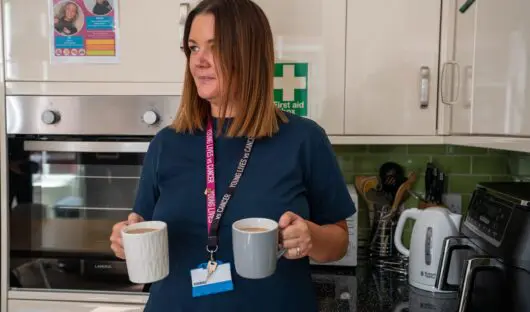Understanding your emotions
It's normal to experience strong and frightening emotions caring for a child with cancer. When they overwhelm you, it can be hard to deal with - especially when you’re trying to ‘keep it together’ and stay strong for those around you. Allowing these emotions in doesn't make you a failure. It’s important to experience them. Even if it’s just so you can take a deep breath, and let them go again.
Anger
Being angry and frustrated after a diagnosis is common. These feelings can hang around long after a traumatic experience so don’t be surprised if it surfaces again later on. Of course your situation will feel unfair. You are bound to question why it happened to you and your family. The anger you feel could come out in different ways – in your relationships, towards your team at hospital or even with your children. There is no need to feel guilty about feeling irritable but it’s good to find ways of dealing with it before it builds up too much.
Redirect it: It’s helpful to have an activity to pour that negative energy into. Any form of exercise will really help – even if it’s punching a pillow!
Be mindful: Mindfulness and breathing techniques can be beneficial to practise in the long term. Why not try a couple out?
Get professional help: Your anger becomes unhealthy when you start causing yourself or others harm. This could be through aggressive behaviour, turning to drink or drugs, or self-harm. That’s when it’s important to seek support. Trained professionals will help you to make sense of these feelings and get to a better place.
When you need to cry, have a good cry, no one can be strong all the time and that is okay. It washes your eyes out so you can see clearly again and carry on the fight.
Depression
Feeling down is natural. You might feel it more acutely when you are tired, anxious or if your child is going through a particularly hard time. However, if feeling low and tearful has become your ‘new normal’ and you aren’t bouncing back, you might be depressed.
Time to reach out: The best and most important thing you can do is to take time out to see your GP. They will be able to help you in a way that works for you – whether that’s referring you on to a specialist, prescribing medication or both. There’s no shame in this. Everyone needs help to cope, especially with the strain you’re under or the trauma you have been through.
If it all becomes too much: If you’re experiencing strong feelings of helplessness or desperation, pick up the phone and talk to one of these organisations now. That is exactly what they are there for.
Fear
You may well be living your worst nightmare. Cancer has many frightening associations and as a parent, not being able to protect your child from this illness could leave you feeling helpless. Uncertainty can be terrifying but there are steps you can take to ground yourself and feel more in control again.
Speak to your team at the hospital: Knowing what to expect can be reassuring. Not all things can be certain but the people caring for your child may be able to dispel some of your fears and put your mind at rest.
Talk to others: Fear can be very isolating so try to share your worries with others, especially those in similar situations. This may help you feel more connected and confident in your ability to deal with everything.
Remember to breathe: If you feel panicked, place the palm of your hand on your stomach and breathe slowly and deeply. These breathing exercises could help,
Guilt
Lots of parents will feel that they did something wrong, or could have done more. You could feel guilty for having difficult thoughts or feelings such as resentment or frustration. Many parents blame themselves for not picking up their child’s symptoms sooner. Some worry that they have, in some way, ‘caused’ the cancer. It is very important to remember that it’s not your fault. Instead, try to focus on everything you have done to help your child.
Stop blaming yourself: One of the most powerful things you can do is to treat yourself like you would your own child. Be kind to yourself. You are doing your best. The better you look after yourself, the better you can care for others.
Stay positive: This can be hard to hear when you’re feeling hopeless but being positive doesn’t mean being cheerful. It’s about looking for the best in a situation and focusing on things you are thankful for.
It’s ok to get help: Guilt can be a destructive force so if you feel it’s taking over and you’re struggling to find positivity in anything, make sure you seek help now.
Loneliness and isolation
Feelings of loneliness can creep up on you in different ways. Your family might be physically divided while your child is in hospital. You might feel you are losing touch with friends, or you might be surrounded by people but feel that no one understands what you’re going through.
If parents are divided, the one who stays at home can be expected to stay strong and ‘hold the fort’, perhaps to work or look after your other children. Often fathers will take up this role and they might lose out on the same level of support provided by the team at hospital or parent networks. This can cause deep feelings of isolation and it’s important that their needs are taken into account too.
Legendary footballer and dad, Frank Lampard, met with a group to discuss the challenges they faced as fathers of children with cancer. They talk about dealing with emotions, juggling daily life, work, money, and how they stayed strong.
I think it can be so hard for dads. Many people ask how my son and I are, but rarely ask about my husband! Society often expect men to just get on and cope but they're suffering this as much as everyone else.
Pick up the phone: People might be cautious about contacting you because they know how much you have on your plate. Making the first move can be hard but you’ll often find that breaking the silence and reconnecting with friends or family can be a big relief.
Blog and vlog: Sharing experiences publicly isn’t for everyone but it can be cathartic and might help others around you understand more about what you’re dealing with.
Tell it to the people who know: Talk to other parents who have been through it. It’s likely they will understand how you feel and can prove to be the best kind of support. There are plenty of online support groups and forums where you can talk to others in similar situations.
Resentment
This is a difficult emotion to handle, yet often parents will feel this way. Life may be unrecognisable now and you might not have time to do things you enjoy. You may feel unappreciated or that your needs are no longer priorities. Or you might see others going about their lives oblivious to the challenges you face.
Change what you can: Although it’s true that you can’t change the situation you’re in, you can take positive action for yourself. Make use of offers from family and friends to create some ‘me time’ – whatever that means to you. This could be getting your nails done, going to an exercise class, a lunch with a friend, taking a walk or simply sitting quietly in peace for a while.
Write it down: Journaling can be a great way to express difficult emotions without worrying about judgement from others. Sometimes getting it out on paper can be a release.


